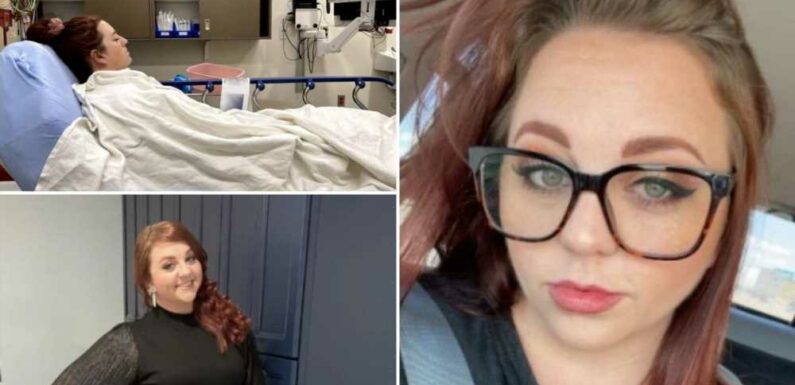
A YOUNG and healthy woman suffered a life-threatening stroke after a chiropractor cracked her neck.
Mariah Bond, 29, visited a chiropractor for the first time in April 2021 – which she hoped would cure her stiff neck.
But after her neck was "cracked" both ways she became "super dizzy".
"Then I started throwing up and I couldn't stop, it was just constant," Maria from New Mexico, US added.
When her husband came to pick her up, the dental assistant's hand started to tingle and the chiropractor advised her to go to urgent care.
Scans revealed Maria had suffered a stroke in her cerebellum – a part of the brain involved in coordinating movement and balance.
Read more on strokes
I’m a doctor – here’s how the temperature in your home could trigger illness
Warning to 500,000 at risk of heart attack or stroke over medication delay
Over 100,000 people suffer a stroke every year in the UK and they're responsible for over 38,000 deaths.
According to the Stroke Association, there are 1.3 million people living in the UK who have survived a stroke – many living with disabilities.
"When he twisted my neck it tore my artery in the back of my neck [on the right side], so my brain didn't get any blood," she explained.
"I was shocked because I'm so young and you don't really hear about young people having strokes, especially from the chiropractor."
Most read in Health
I'm allergic to almost everything & only eat 5 foods – but shopping takes 3 mins
You've been sleeping all wrong – 6 easy ways to put snoring to bed for good
How often should you be pooing? Dr Zoe shares optimum routine
The ultimate guide to the best night's sleep ever in 13 simple steps
The stroke left Maria in hospital for five days, while she was monitored, given aspirin and told to rest to help the vessel to heal.
"I couldn't walk properly or correctly use my hands to eat, it was like I was a child, it was very weird, my brain was there but I couldn't do it," she said.
After two months of physiotherapy, "strong willed" Mariah was finally able to walk normally again and received the good news that the vessel had completely healed last June.
"I had my last neurosurgery appointment and he cleared me but said that I have to take aspirin for the rest of my life, just in case."
Since the injury, Maria has has vowed to never visit a chiropractor again and is keen to raise awareness of the risks that their adjustments can cause.
"I've already told a million people not to do it," she said. "Just don't go or at least don't let them do your neck."
What are the symptoms?
The FAST method – which stands for Face, Arms, Speech, Time – is the easiest way to remember the most common symptoms of stroke:
F = Face drooping – if one side of a person's face is dropped or numb then ask them to smile, if it's uneven then you should seek help.
A = Arm weakness – if one arm is weak or numb then you should ask the person to raise both arms. If one arm drifts downwards then you might need to get help
S = Speech difficulty – if a person's speech is slurred then this could be a sign of a stroke
T = Time to call 999 – if a person has the signs above then you need to call 999 in the UK or 911 in the US for emergency care.
Other symptoms include:
- sudden weakness or numbness on one side of the body
- difficulty finding words
- sudden blurred vision or loss of sight
- sudden confusion, dizziness or unsteadiness
- a sudden and severe headache
- difficulty understanding what others are saying
- difficulty swallowing
If any of these symptoms occur for less than a few hours, you could be suffering from a transient ischaemic attack (TIA).
Read More on The Sun
Shocking video reveals why you should never rub your eyes if you’re tired
Shoppers rave about Primark coat that’s ‘perfect dupe’ for £290 North Face version
This attack, which is sometimes known as a "mini-stroke", indicates that there is a problem with the blood supply to your brain.
It’s important to contact your GP or local hospital if experiencing these symptoms, as they could increase your risk of stroke in the near future.
Source: Read Full Article










